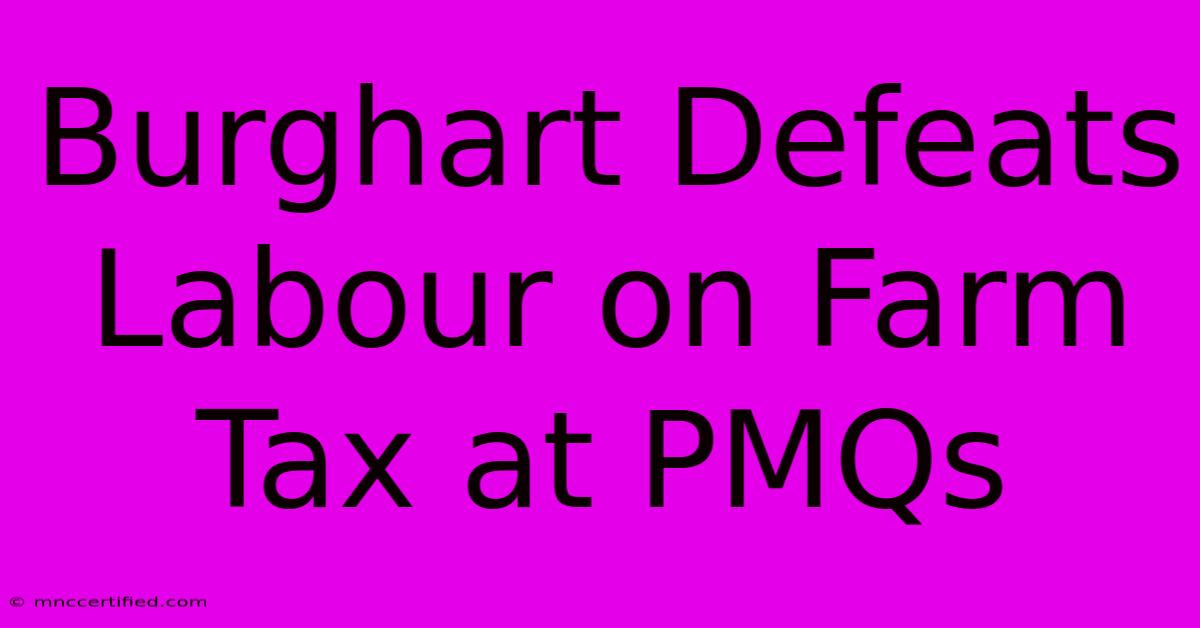Burghart Defeats Labour On Farm Tax At PMQs

Table of Contents
Burghart Defeats Labour on Farm Tax at PMQs: A Victory for Rural Communities?
The recent Prime Minister's Questions (PMQs) session witnessed a significant clash between the Conservative government and the Labour opposition over proposed farm taxes. Conservative MP, David Burghart, emerged victorious, successfully defending the government's stance against Labour's proposed amendments. This win has sparked debate, with supporters hailing it as a victory for rural communities and opponents criticizing it as a blow to environmental sustainability and fair taxation. This article delves into the specifics of the debate, examining the arguments from both sides and analyzing the potential long-term implications of the decision.
The Clash at PMQs: Burghart vs. Labour
The heart of the debate centered on Labour's proposed amendment to the Agriculture Bill. This amendment sought to introduce a new tax on large-scale, intensive farming operations, arguing that it would help level the playing field for smaller, more sustainable farms and generate revenue for environmental protection schemes. Labour MP, Sarah Jones, passionately argued that the current system unfairly favors large farms, contributing to environmental damage and undermining the viability of smaller, family-run farms. She emphasized the need for fair taxation and sustainable agriculture.
Burghart, however, countered these arguments, effectively defending the government's position. He highlighted the potential negative economic consequences of the proposed tax, arguing it could lead to job losses in rural areas and drive up food prices. He emphasized the importance of supporting British farming and ensuring the country's food security. His speech successfully appealed to a key concern: the potential for increased costs for consumers. The PMQs debate became a pivotal moment, showcasing the differing visions for the future of British agriculture.
Key Arguments For and Against the Proposed Tax
Arguments in favor of the Labour amendment:
- Environmental Sustainability: The proposed tax aimed to incentivize more environmentally friendly farming practices, discouraging intensive methods harmful to biodiversity and soil health. This aligns with the growing global concern for climate change and environmental protection.
- Fair Competition: Supporters argued that a level playing field was needed to support smaller, more sustainable farms that often struggle to compete with larger, more intensive operations. This highlights the importance of supporting small businesses within the agricultural sector.
- Revenue Generation: The tax was expected to generate revenue that could be reinvested in supporting sustainable agriculture and environmental initiatives. This addresses the need for government funding in crucial areas.
Arguments against the Labour amendment:
- Economic Impact: Opponents argued the tax would negatively impact the profitability of large farms, potentially leading to job losses and reduced food production. Concerns over economic stability and potential food shortages were raised.
- Increased Food Prices: The fear of higher production costs being passed onto consumers, leading to increased food prices, was a significant concern. The potential for inflation caused by the tax was a key talking point.
- Administrative Burden: Implementing and enforcing a new tax would require significant administrative resources, which could prove costly and inefficient. This underlines the need for effective and cost-effective governance.
The Aftermath and Long-Term Implications
Burghart's successful defense of the government's position has significant long-term implications. While it may offer short-term economic stability for large farms, it raises questions about the government's commitment to environmental sustainability and supporting smaller, more eco-friendly agricultural businesses. The debate highlights a broader tension between economic priorities and environmental concerns within the agricultural sector. Further discussion and potential policy changes are likely to follow.
The future of British farming hangs in the balance, and this PMQs exchange serves as a significant marker in that ongoing conversation. The outcome will likely influence investment decisions, farming practices, and the overall landscape of British agriculture for years to come. The ongoing debate requires careful consideration of both economic and environmental factors to ensure a sustainable and prosperous future for the sector. Further analysis will be needed to assess the true impact of this decision on rural communities and the environment.

Thank you for visiting our website wich cover about Burghart Defeats Labour On Farm Tax At PMQs. We hope the information provided has been useful to you. Feel free to contact us if you have any questions or need further assistance. See you next time and dont miss to bookmark.
Featured Posts
-
18 45 An Hour Is How Much A Year
Nov 21, 2024
-
Jamie Lee Komoroski Bond Hearing
Nov 21, 2024
-
Lapse In Home Insurance Coverage
Nov 21, 2024
-
Insurance Brokers Port Macquarie
Nov 21, 2024
-
Suits La Premiere Date Set
Nov 21, 2024